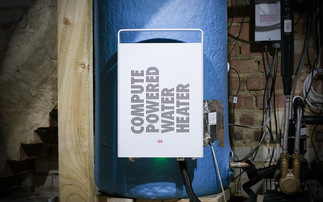Energy efficiency services for businesses could be at the heart of a locally-driven economic recovery - all that’s needed is a toolkit to create solutions that businesses actually want, argues EnergyPro's Alex Rathmell
Local businesses need some good news. Autumn's second lockdown and ongoing restrictions have presented an existential threat for some, and the adaptability and resilience of all are being put to the test. And at the time of writing it seems likely that an unknown number of firms will receive a further body blow from Brexit early in 2021, regardless of whether or not a trade deal is finalised.
If businesses had any concerns about the climate crisis they could be forgiven for putting them on hold. But climate breakdown is still accelerating, and fulfilling the country's legally-binding commitment to net zero carbon will require businesses to drastically reduce their energy demand, then fully decarbonise the remainder.
There is no getting around this: small and medium enterprises (SMEs) represent a vast chunk of the economy. There are 6 million of them, incorporating everything from sole traders to multinational technology companies, employing 16.8 million people and turning over £2.3tr per year. And they currently waste a lot of energy. According to BEIS, there is £5.8bn of attractive energy-saving investment currently locked away in UK-based SMEs, and far more would be required to get them all to net zero.
But when it comes to reducing SMEs' environmental impacts, the techniques that exert pressure on larger corporations don't necessarily work. SMEs are not subject to the same regulatory and reporting requirements as large businesses, they don't experience strong shareholder pressure to reduce emissions or other environmental impacts, and may experience no customer pressure at all. Of course they have to obey relevant regulations, but these just limit damage - the law does not (yet) actively push them towards net zero. As a result, SMEs' progress on energy efficiency and clean energy has historically been slow, even before the twin horsemen of Brexit and Covid arrived.
So we cannot rely on sticks to get SMEs to take positive action to reduce their emissions. Instead we need to reach for the carrots, but to make even these palatable we have to understand how SMEs make decisions. What matters to them, and what will they respond to? Not just in business-as-usual, but in these extraordinarily challenging times.
It is very difficult to generalise, because ‘SME' is such an absurdly broad category, so it is essential to subcategorise further to really understand businesses' drivers. But we can say two things fairly confidently:
- SME decision-making is a hybrid of ‘corporate' and ‘individual' approaches. We can think of ‘corporate' decision-making as economically rational, whereby potential investments are appraised and subjected to a defined hurdle rate. (Whether businesses do this consistently in reality is another question.) And we can frame ‘individual' decision-making as more led by gut-feel, reputational drivers and personal values.
- Most SMEs are fundamentally local. In fact they are the bedrock of the local economy in your area, and mine, and everywhere else. Many SMEs serve local customers, employ local staff, use local supply chains (particularly for services), and have owners who live nearby.
The obvious upshot from this is that local reputation matters to SMEs. I am not expecting any prizes for this insight, anyone who has ever driven around a sponsored roundabout can reach the same conclusion. But it is tempting to think that we live in a globalised world where physical location no longer matters, dominated by ubiquitous, highly mobile corporates sitting behind huge global brands. While this is somewhat true, our collective experience in 2020 has re-emphasised how important locality and community are in our lives, and the importance of cherishing and investing in them. Local businesses are a major part of this as providers of essential goods, services and employment, and as forces that shape the character of a local area.
I have come to believe that this local factor holds the key to releasing the ‘sleeping giant' of emissions reductions currently locked away within SMEs.
When a business carries out a project, going above-and-beyond regulations to become more energy efficient, it might achieve a several things. It achieves a financial saving because it has to buy less energy (and in most cases the business case for efficiency ends there, but there is much more). It becomes more competitive and resilient as a result of this saving. It creates a better, healthier and more productive workplace, which has never been more important as new working practices are established post-Covid. And finally, it commits an act of responsible ‘citizenship', taking a measure of responsibility for our shared environment by reducing its negative impact.
Consider the community energy movement. Across the country, the personal impulse to take action on climate breakdown and to improve the places where we live is being successfully channelled into the development of solar power projects and other clean energy initiatives. Community energy organisations had developed renewable projects generating 154.4 MW by 2019. And the ‘Greta effect' continues to matter: Low Carbon Hub's recent fundraising has seen unprecedented uptake of investment in solar energy developments by individuals in Oxfordshire who want to put their money into something positive and local.
The lesson is that people - among them the people that own and run local businesses - are prepared to invest time and money at scale in environmental solutions simply because they care. But there is another factor: they have to be provided with a pathway. Community energy is succeeding because project development and investment have been thoroughly de-risked through standardisation and industry quality standards, meaning investors and project developers have a clear ‘playbook' and can proceed with confidence.
By contrast, a major reason for the low traction of energy efficiency across SMEs is the fact that they haven't been offered appealing, easy, low-risk solutions. Being small scale, and sometimes fiddly and fragmented, they are unattractive for energy services companies like the ones that deliver large, multi-measure projects for the public sector. So instead they are offered individual products rather than integrated solutions, they receive minimal quality assurance and no guarantee of performance, and they must identify trustworthy contractors and then fund or finance the project themselves, diverting precious human and financial resources away from the core business. In short, SMEs perceive efficiency investments to be too complicated and too risky - and frankly, they're right.
To change this we have to do two things simultaneously. We have to unlock a business's latent wish to be a responsible part of its community and act against environmental breakdown. And at the same time, we have to make it really easy for them to do sp.
Actually there's a third thing. We also have to help them create positive reputational value, so their customers and the local community can see that they are a responsible business led by responsible people. This is particularly important for energy efficiency where many of the best projects are secreted away in a plant room, never to be seen by customers.
This combination of energy services needs to be delivered by a local body that works exclusively with businesses to seed and facilitate energy efficiency and renewables projects. There are some fantastic examples of this already, including an array of European-funded programmes offering grant-funded energy audits to businesses. This service is great for identifying the investments that a business should make, but current programmes stop short of offering a pathway for finance and implementation, with the result that many companies are not able to act on the recommendations, to the frustration of all concerned.
The challenge is that taking the facilitation service to that next stage means confronting some daunting barriers to entry. How can a community-based organisation be expected to tackle standardised project development, project management, supply chain management, guaranteed savings, finance, insurance, measurement and verification, and everything else involved?
Working with partners at Low Carbon Hub and Oxford Brookes University, we believe we have a solution to that challenge, currently being piloted in Oxfordshire under a grant from the Department of Business, Energy and Industrial Strategy (BEIS). Our solution is called ‘ESCO-in-a-box' because it provides everything needed to establish and operate new breed of energy services company, locally-focused, community-based, and able to offer SMEs a clear, easy pathway for energy projects. We provide access to suitable finance from a panel of pre-approved lenders, so ESCOs don't need to do this in-house.
We have thought carefully about how ESCO-in-a-box should create appealing solutions that SMEs can easily adopt. The system takes inspiration from the way that large energy performance contracts offer clients a guaranteed saving, heavily adapted for an SME client base, meaning that projects are self-financing and require no up-front expenditure. But it is also essential that our new ESCOs contribute to the economic development of their region, so we provide a toolkit for establishing and maintaining a framework of local contractors to carry out works, and the quality assurance tools to hold them to account for delivery and performance.
It has been said many times, but the recovery from Covid - when it comes - presents an unprecedented opportunity to upgrade buildings and facilities to attract customers, improve staff health and wellbeing, and reduce emissions. It is becoming more widely recognised that energy efficiency is a phenomenal job creator and a driver of prosperity, and we hope to provide a solution that allows regions to capture and retain this value, while moving closer to their net zero targets.
Our first Community ESCO, Energy Solutions Oxfordshire, is now in operation and serving clients in the county. We're now forming partnerships to roll out ESCO-in-a-box, to help businesses and regions across the UK make a green recovery. If your area or your business could benefit, please get in touch at www.epconnect.energy.
Alex Rathmell is Managing Director, Consultancy, EnergyPro Ltd and Project Manager of EPConnect's ESCO-in-a-box https://www.linkedin.com/in/alex-rathmell.
The development and piloting of ESCO-in-a-box is funded by the Department of Business, Energy and Industrial Strategy (BEIS) through the 'Boosting Access for SMEs to Energy Efficiency' (BASEE) programme. EnergyPro Ltd is working in partnership with Low Carbon Hub and Oxford Brookes University on this project. More details on the BASEE programme can be found here.








